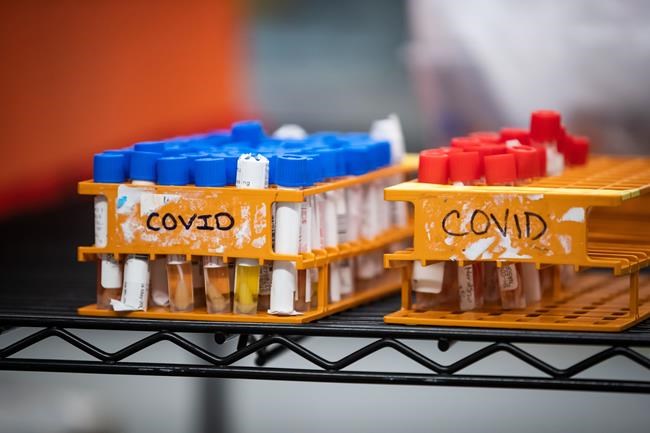Feds pledge $440 million to join international vaccine program
Advertisement
Read this article for free:
or
Already have an account? Log in here »
To continue reading, please subscribe:
Monthly Digital Subscription
$0 for the first 4 weeks*
- Enjoy unlimited reading on winnipegfreepress.com
- Read the E-Edition, our digital replica newspaper
- Access News Break, our award-winning app
- Play interactive puzzles
*No charge for 4 weeks then price increases to the regular rate of $19.00 plus GST every four weeks. Offer available to new and qualified returning subscribers only. Cancel any time.
Monthly Digital Subscription
$4.75/week*
- Enjoy unlimited reading on winnipegfreepress.com
- Read the E-Edition, our digital replica newspaper
- Access News Break, our award-winning app
- Play interactive puzzles
*Billed as $19 plus GST every four weeks. Cancel any time.
To continue reading, please subscribe:
Add Free Press access to your Brandon Sun subscription for only an additional
$1 for the first 4 weeks*
*Your next subscription payment will increase by $1.00 and you will be charged $16.99 plus GST for four weeks. After four weeks, your payment will increase to $23.99 plus GST every four weeks.
Read unlimited articles for free today:
or
Already have an account? Log in here »
Hey there, time traveller!
This article was published 25/09/2020 (1908 days ago), so information in it may no longer be current.
OTTAWA – Canada will spend $440 million to join an international program that is trying ensure COVID-19 vaccines aren’t just hoarded by rich countries, Prime Minister Justin Trudeau said Friday.
But Canada is spending more than twice that to gain its own access to millions of doses of some of the most promising vaccines in development. That includes a deal Trudeau announced at the same time with AstraZeneca for up to 20 million doses of its vaccine candidate, which is in the third and final phase of clinical trials.
That agreement is the sixth of its kind the Canadian government has reached with a drug company working on a vaccine.

“Canadians must have access to a safe and effective vaccine against COVID-19 as quickly as possible no matter where it was developed,” Trudeau said at a news conference on Parliament Hill Friday.
Canada has committed more than $1 billion to buy up to 282 million doses of potential vaccines. The doses will only become available here if they successfully complete clinical trials and Health Canada approves them.
Up to 15 million additional doses, under the same conditions for approval, will come from the COVID-19 Vaccine Global Access Facility, known as COVAX.
The facility is one of three parts of a World Health Organization-led coalition to ensure testing, treatment and vaccines for COVID-19 are developed and distributed fairly around the world. Through COVAX, wealthy nations like Canada can pay to get guaranteed access to some vaccine doses, and also contribute to help poorer countries get vaccines.
Canada’s $440-million commitment includes $220 million to buy doses of vaccines for Canadians, and another $220 million to contribute to the fund to help 92 low and middle-income countries..
COVAX has negotiated deals with nine vaccine developers, three of which are among those Canada already has access to through private deals. But there are six vaccines Canada could get through COVAX that it has no access to at the moment.
COVAX is a first-of-its-kind initiative that recognized ending the COVID-19 pandemic requires all countries to have access to treatments and vaccines, and that in previous pandemics, wealthy countries have been able to protect their citizens while poorer nations could not.
International Development Minister Karina Gould said in an interview that Canada is not undermining COVAX’s efforts by investing in it and signing side deals directly with manufacturers. She said through COVAX, Canada is securing doses for Canadians and for countries that can’t afford vaccines on their own.
“That’s not to say we can’t make these agreements with other companies for Canadians as well,” she said. “We’re really trying to make sure we’re providing fair and equitable access right around the world.”
But Jason Nickerson, the humanitarian-affairs adviser at Doctors Without Borders, said there is not going to be enough vaccine supply for everyone around the world to get a vaccine right away.
He said the moral and ethical question is: will the private deals being made by Canada and other rich countries mean that Canadians who are at low risk to get infected or get severely ill from COVID-19 get vaccinated before high-risk people in lower-income countries?
Front-line health workers everywhere should be vaccinated before low-risk people anywhere, said Nickerson.
“We’re dealing with vaccines that are going to be in high demand and low supply,” he said. “There are billions of people around the world who want access to this vaccine but we need to be smart about how this is distributed.”
Canada hasn’t yet said what its strategy will be to prioritize vaccinations here.
He also pointed out that Canada’s side deals have potentially secured enough doses of vaccine to vaccinate each Canadian more than seven times.
Not all those vaccines may be approved, but it is very likely Canada will end up with more vaccines than it needs, and Canada has not indicated what will happen if there is excess.
This report by The Canadian Press was first published Sept. 25, 2020.



